

Tech and me: an autoethnographic account of digital literacy as an identity performance. Adams, T.
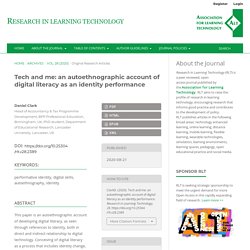
E., Jones, S. H. & Ellis, C. (2015) Autoethnography, Oxford University Press, NewYork, NY. Bali, M., et al., (2015) ‘What makes a cMOOC Community Endure? MindShift. About Alchetron. We live in a digital age driven by information.
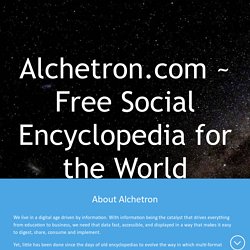
With information being the catalyst that drives everything from education to business, we need that data fast, accessible, and displayed in a way that makes it easy to digest, share, consume and implement. Yet, little has been done since the days of old encyclopedias to evolve the way in which multi-format information can be quickly and uniquely accessed from one central hub. China Biographical Database Project (CBDB)
Social network analysis (SNA) provides an alternative to the factor-based approach in L.
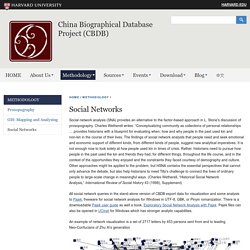
Stone's discussion of prosopography. Charles Wetherell writes: “Conceptualizing community as collections of personal relationships … provides historians with a blueprint for evaluating when, how and why people in the past used kin and non-kin in the course of their lives. The findings of social network analysts that people need and seek emotional and economic support of different kinds, from different kinds of people, suggest new analytical imperatives. It is not enough now to look solely at how people used kin in times of crisis. Analysis 2020 – Top Tools for Learning 2020. The Top 200 Tools for Learning 2020 was compiled by Jane Hart from 2,369 votes from 45 countries in the 14th annual survey and was published on 1 September 2020. 59% of respondents came from companies, businesses and non-profit making organisations whilst 41% worked in education (although only 6% taught in K12 schools so the tools predominately reflect the situation in higher and adult education).
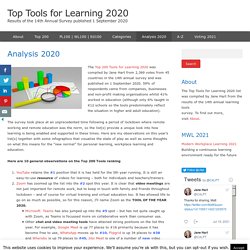
The survey took place at an unprecedented time following a period of lockdown where remote working and remote education was the norm, so the list(s) provide a unique look into how learning is being enabled and supported in these times. Here are my observations on this year’s list(s) together with some infographics that visualise the state of play as well as some thoughts on what this means for the “new normal” for personal learning, workplace learning and education. Here are 10 general observations on the Top 200 Tools ranking Personal Learning in 2020 Workplace Learning in 2020. The Emergence of the Digital Humanities (Open Access) The past decade has seen a profound shift in our collective understanding of the digital network.
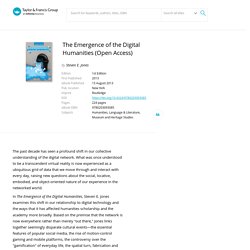
What was once understood to be a transcendent virtual reality is now experienced as a ubiquitous grid of data that we move through and interact with every day, raising new questions about the social, locative, embodied, and object-oriented nature of our experience in the networked world. In The Emergence of the Digital Humanities, Steven E. Jones examines this shift in our relationship to digital technology and the ways that it has affected humanities scholarship and the academy more broadly. The Open Access version of this book, available at has been made available under a Creative Commons Attribution-Non Commercial-No Derivatives 4.0 license. The Emergence of the Digital Humanities. The past decade has seen a profound shift in our collective understanding of the digital network.
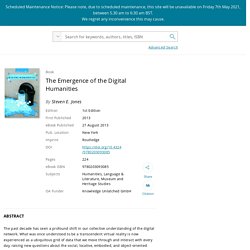
What was once understood to be a transcendent virtual reality is now experienced as a ubiquitous grid of data that we move through and interact with every day, raising new questions about the social, locative, embodied, and object-oriented nature of our experience in the networked world. In The Emergence of the Digital Humanities, Steven E. Sarah Pink - Digital Ethnography Research Centre. Sarah Pink is design anthropologist, researcher, consultant and thought leader, whose work focuses on scholarship and intervention in the fields of technology design, digital technologies in everyday life and design for wellbeing.
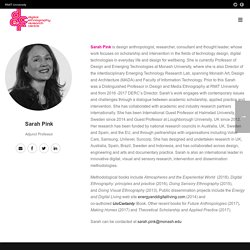
She is currently Professor of Design and Emerging Technologies at Monash University, where she is also Director of the interdisciplinary Emerging Technology Research Lab, spanning Monash Art, Design and Architecture (MADA) and Faculty of Information Technology. Prior to this Sarah was a Distinguished Professor in Design and Media Ethnography at RMIT University and from 2016 -2017 DERC’s Director. Sarah’s work engages with contemporary issues and challenges through a dialogue between academic scholarship, applied practice and intervention. DIGITAL HUMANITIES. UCL Centre for Digital Humanities. In addition to the full Master's programme, the following short courses in Digital Humanities are also offered by the Department of Information Studies.
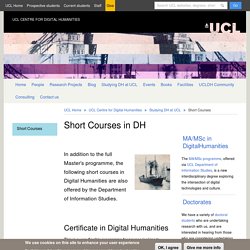
Certificate in Digital Humanities This is a very flexible programme for anyone looking to extend their skill set, particularly for CPD. Get a master degree in digital humanities online. - I chose to study Digital Humanities because I was curious about the programme.
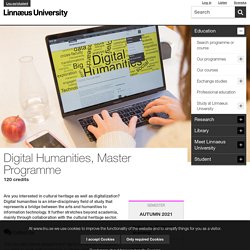
I have a bachelor’s degree in Library and Information Studies and wanted to expand my knowledge by studying more. Digital Humanities felt like a natural continuation for me since I’m interested in cultural heritage, digital transformation, and digital preservation. Helsinki Centre for Digital Humanities. New international online Master in Digital Humanities. Blogs and Vlogs. Vlogging About School on YouTube An Exploratory Study. Video Media. Digital Curation. Libraria. Bookmobiles. References Unveiled. Historically. Likelihoods.